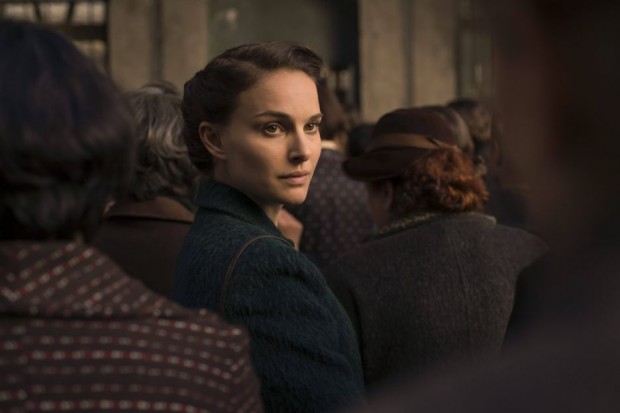
What Does a Star Do After Winning the Academy Award for Best Actress?
A continent away from the NY Jewish Film Festival, it’s not just the Academy Awards that are Snow White. The industry itself is still a white boys’ club, according to the study on minorities, women and LGBT voices just released by the Media, Diversity and Social Change Initiative at the University of Southern California Annenberg School for Communication and Journalism. In film, only 29 percent of speaking parts went to women and girls in the last two years. Only two percent of directors are women. Back to Natalie Portman and her influence: the study found that when women are directing, casts tend to reflect greater diversity.
Touching on three other NYJFF’s films by or about women—“The Law” (see a clip here) is Christian Faure’s mesmerizing feature (France, 2015, with English subtitles) on French health minister Simone Veil’s political victory pushing through the law legalizing abortion. Veil, a survivor of Auschwitz, is a political conservative who distances herself from the feminists. And because this is France, actress Emmanuelle Devos as Veil is a magnificent symbol of the establishment in stunning suits, handsome gold jewelry, and a truly magnificent apartment in a building whose outer walls are desecrated with swastikas at the height of the legislative battle.
During the Q&A, Faure said that he had no trouble attracting a major actress to the starring role. As recently as this past year, the French people once again voted Veil their No. 1 French woman.
“The Law” was broadcast on French television 40 year to the day of the nation’s legalization of abortion. Hopefully it will make its way to U.S. cable. It’s a reminder that certainly reverberates here in the U.S., with legal abortion under growing and remorseless threat.
You may have been unaware of pioneering Belgian filmmaker Chantal Akerman before her suicide last year. The festival’s U.S. premiere of “I Don’t Belong Anywhere: The Cinema of Chantal Akerman” (2015, French, with English subtitles), the Belgian film made by her long-time colleague, is a mesmerizing introduction. Director Marianne Lambert captures Akerman’s marvelous risk taking self––financing her first 35 mm film as a ticket seller at a porno film theater, pocketing the ticket money; hauling away a pile of presumably discarded film for her own production. Lambert films the seemingly open Akerman in New York, Belgium and Israel in a stark Judean Desert landscape. She filmed Akerman just after her mother’s death in 2014, with Akerman saying: “I realized my mother was at the heart of my work. And now that my mother is no longer there, will I have something to say?” (Free screenings will take place at New York’s Film Forum March 30-April 5.)
Holocaust-related films seem to have slipped off the surface of this year’s film festival, but they’re in the undertow––Simone Veil, Auschwitz survivor; Chantal Akerman, with her intensely close relationship to her mother, a Holocaust survivor.
Watch for the simple, short, endearing documentary “Period. New Paragraph” (2015). Filmmaker Sarah Kramer has her camera running as her father packs up the Manhattan law office he has worked out of for 40 years. Herbert Kramer never threw anything out, and he’s articulate about it. Part of the cleanup, the filmmaker’s mother makes a cameo appearance in the film, and, shepping nachas, father, mother, and filmmaker were all at the festival screening.
For in-your-face Jewish New York, the annual film festival at Lincoln Center is not the event it is in San Francisco, where Jews enthusiastically flock to the 35-year-old festival as their High Holidays. In New York, Lincoln Plaza Cinema regularly screens Jewish films and the Manhattan JCC hosts The Other Israel Film Festival. But the NYJFF is the chance to take in the charisma of a Hollywood star who’s produced a film in Hebrew, acknowledging her roots, and to be part of the anxious, pushy New York Jewish community queuing up for tickets to sold-out screenings, with the chance to hear from––and question––the filmmakers and their stars.
And maybe, with the Oscar fallout, the number of both ethnic minority and female majority filmmakers will grow––including at Jewish film festivals.
Two NYJFF screenings were rescheduled because of snow to March 30 at Walter Reade Theater: “Benya Krik” at 6:30 p.m and “Hot Sugar’s Cold World” at 9 p.m.



